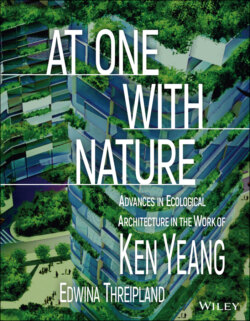Читать книгу At One with Nature - Ken Yeang - Страница 14
Оглавлениеxiv INTRODUCTION
His most recent work – which is explored in this book – has honed that rigorous
research towards architecture specifically mimicking nature’s processes. He now
integrates the human-made with the landscape completely, because his current theoretical
work is on ‘ecomimesis’ – the idea of designing by emulating and replicating by design
the attributes in nature’s ecosystems. He is among the few architects whose built work
is properly ecocentric, in terms of designing and building wholly based around the science
of ecology. This is perhaps what differentiates his work and ideas from other ‘green’
architects, many whose credentials are essentially driven by engineering technology, or
are simply based on green accreditation systems such as LEED or BREEAM.
There are specific patterns to the manner in which Ken consistently assimilates
biotic constituents with the inorganic structures of the built environment. For example,
one device regularly employed involves constructing sustainable territories within the
wider development and then populating them with selected indigenous fauna species,
to augment the local habitat. These are coordinated with selected flora typologies to
create a multifarious ‘biodiversity matrix’ that goes much deeper than merely adding
greenery or landscaping to his built forms. The book specifically focuses on his practice’s
latest projects, defining and explaining every cutting-edge tested technology, and newest
innovation within each scheme. This is coupled with a pursuit of the aesthetics of
ecological design, seeking to define in terms of form and materiality what a green building
or masterplan could and should look like.
Ken’s continued persistence in advancing green design towards ecocentrism
makes it environmentally significant; the Guardian newspaper named him as one of the
‘50 People Who Could Save The Planet’ in 2008. That urgency is now increasingly being
realised globally, and his work has never been more pertinent or visionary. Ken’s belief
is that up until the last decade, architects sought only to prevent further impairments
of the natural environment. Today – with the extent of devastation and its impact on the
biosphere evident – the design effort must become a full ‘race and rescue’ mission. His
ideas are therefore relevant not only to those in the design professions but also to others
worldwide who share his concern for the future of the planet.
